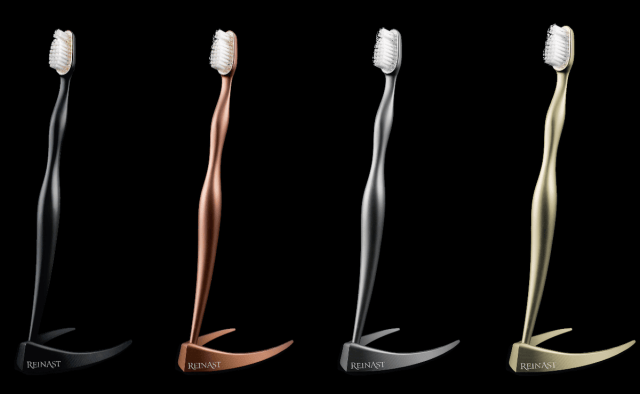
A quick, envious glance through James Edition — “the world’s largest luxury marketplace” — reveals some truly awe-inspiring goods. A private helicopter, for instance, can be had for $870,000; multi-million dollar yachts, Georgian manors, and an original Swiss bank safe full of 15 tons of liquid money are all one-click purchase options. But listed beside diamond-encrusted Rolexes and Aston Martins is an unlikely candidate for a luxury good: a toothbrush.
When we wrote about $8 “luxury” ice cubes a little over a month ago, we never, in our wildest dreams, thought we’d encounter a more confidently-priced item. But in the vein of taking a cheap, perfectly functional product and making it 1,000 times more expensive with minimal added benefits, Reinast, a German “luxury toothbrush” company, has truly outdone itself.
In January 2013, a small team of “dental hygiene experts” and design gurus gathered in a workshop in Düsseldorf, Germany and decided the modern toothbrush market was lacking luxury and pizazz. The resulting product: a $3,200 Euro (about $4,300 USD), full-titanium œuvre d’art.
Reinast’s website greets prospective critics with a fitting quote, from Oscar Wilde’s The Picture of Dorian Gray: “Those who find ugly meanings in beautiful things are corrupt without being charming…Those who find beautiful meanings in beautiful things are the cultivated.” In an accompanying concept video, the company likens its creation to a world-class sports car worthy of Zeus’s affection:
“Undulating curves of the sleek and slender body encompass elegance and sumptuousness. A unique design….German precision engineering…a decisively lightweight full-titanium body which has unparalleled durable strength. The accomplished silhouette captures elegance and timelessness where beauty, functionality and utility complement each other. A timeless luxury is now an option.”
Somewhat ironically, the world’s most expensive toothbrush was inspired by the “simplicity of the Miswak” — a traditional Arabian teeth-cleaning twig that is the antithesis of luxury. The Miswak, which is made out of the naturally antimicrobial Salvadora persica tree, is one of many such devices used in third-world countries as cheap alternatives to toothbrushes. These “chew sticks” date back as far as 3000 BC, and were used by ancient Egyptians to maintain hygiene.
Rooted in the modern world, Reinast touts its product as one that “merges exceptional functionality with a design that transcends time.” But despite its price, the toothbrush is fairly utilitarian. While the one-piece handle is “manufactured from solid titanium,” it provides little in way of improving the brushing experience, other than a simple antibacterial coating that “elevates the product’s beauty.” This coating, claims the company, “is one of the latest innovations in medical technology: it is durable, safe and at the same time shields against resistant germs.”
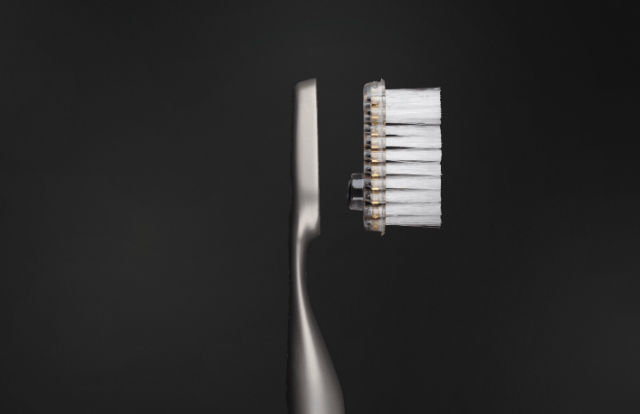
Reinast’s detachable, antimicrobial, very expensive bristle heads
If you’re looking to score a Reinast for just $4,300, keep in mind that that’s merely the company’s entry-level “Premium” package price: it’ll get you one “everlasting” titanium toothbrush in a color of your choice (rose, champagne, matte-black, or just plain titanium), one titanium toothbrush holder (with “anti-slip pad”), a bumper, and what they call “Fresh Service” for 3 years — every six months, they’ll send you six bristle heads (choice of soft or medium) and a new bumper.
But if this toothbrush truly lasts the rest of your life as they claim, you’ll have to upgrade your Fresh Service plan — a maneuver that will cost you substantially more than $4,000. Reinast offers a 5-year plan ($400), 7-year plan ($800), and an 11-year plan ($1,600). Hypothetically, if you bought the toothbrush as a 30-year-old and owned it until, say, age 85, you’d be spending roughly $8,000 on replacement heads for the Reinast over your lifetime (five 11-year renewals). Now, let’s assume you instead purchase a new plastic toothbrush, at $3.99, every three months for the rest of your life: that’s $16 per year for 55 years, or $880.
What’s more, if you’re not satisfied with your titanium brush’s elegance, you can personalize it with an engraving — a service that typically costs $20-40 at a specialty shop. Reinast will gladly do it for you, at a base price of $540.
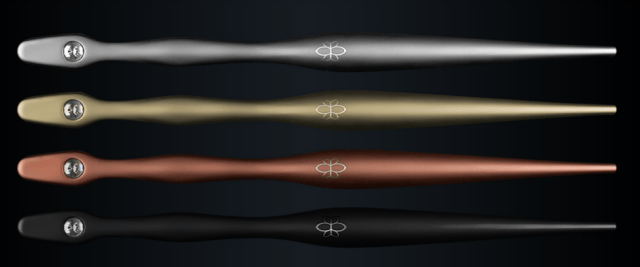
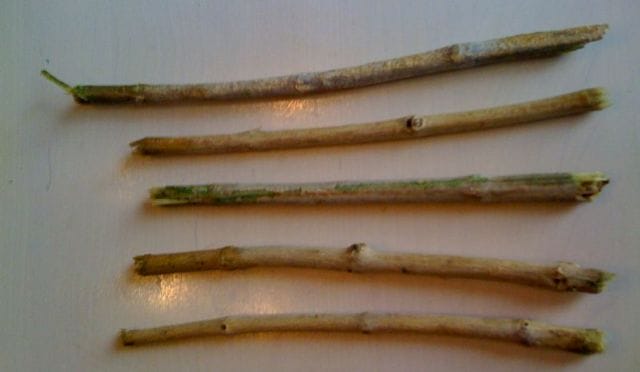
Reinast toothbrush (top), and Miwak (traditional Arabian toothbrushes, bottom)
Several other titanium toothbrushes exist on the market; nearly all of them provide more benefits than the Reinast at less than 1/100th of the cost. For instance, the Soladay, which was introduced in the United States in 2007, uses a core of titanium dioxide that “facilitates a plaque-removing electrochemical reaction.” An integrated solar panel on the brush generates electrons which “move along a wire to the semiconductor titanium rod near the bristles.” When these electrons are combined with water, a chemical reaction is triggered that breaks down plaque. For all this, you’ll shell out $49.95.
Another brush which emerged a few years ago, the TiFinity, enlisted “fine, flexible titanium bristles” that lasted up to ten times longer than those made of traditional nylon. Before being discontinued, the concept received favorable initial reviews from dentists and was similarly priced at $46.95.
The Reinast — at literally 100 times the cost — does none of these things. Instead, the company insists that its sleek titanium handles and “microbe technology” are more than enough to incentivize spending thousands on a toothbrush (titanium is currently $16.15 per kilogram on the US market, and antimicrobial technology can be had for pennies of the dollar).
To be fair to Reinast, all toothbrush makers — Oral B, Colgate, Crest, and the like — drastically mark up their products. Typically, a bare-bones polypropylene plastic toothbrush runs anywhere from $1 to $5, depending on its bells and whistles, but only costs about 65 cents to produce (in raw materials, equipment, labor, and other plant costs). As pricing analyst John Mothersole told the Seattle Times, “Oral B spends a lot of time and marketing effort to convince you their $4.99 toothbrush is better” — though functionality-wise, it’s simply no different than a dollar-store toothbrush.
Of course, there’s no foul in creating a luxury product if there’s a market willing to buy, right? Reinast didn’t confirm any sales with us, and we were unable to find any testimonials or reviews online, but we did find this picture of rapper 2-Chainz repping his new toothbrush, somewhat incredulous to its price:
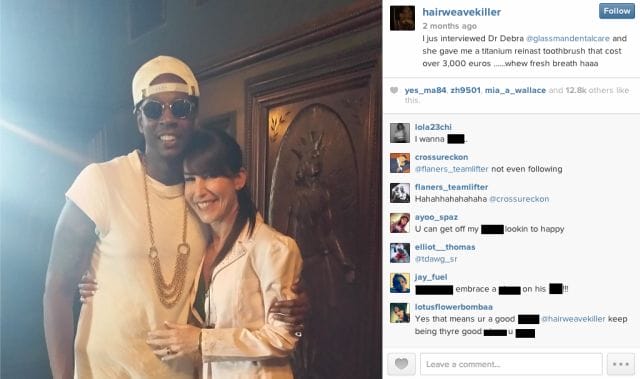
This post was written by Zachary Crockett. Follow him on Twitter here, or Google Plus here.



